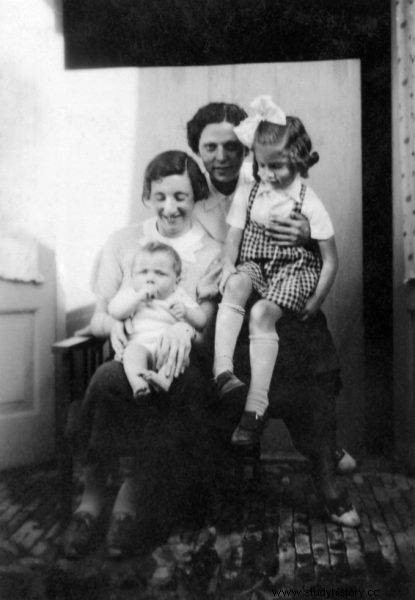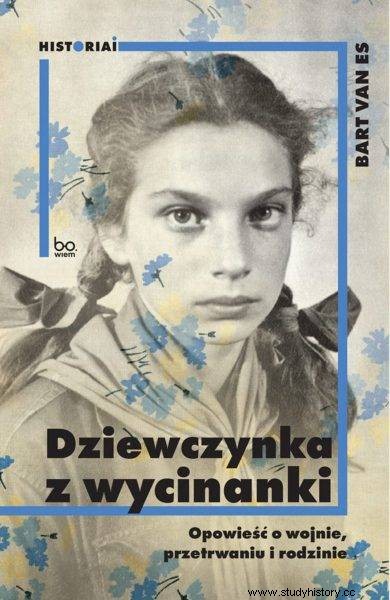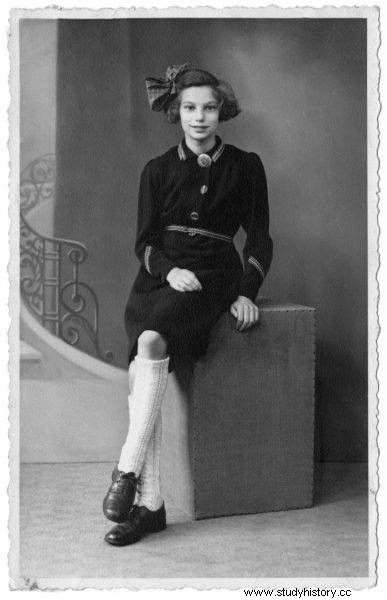Her parents are dead. She herself survived only because she was placed in a foster family. She passes from the care of one adult to the care of the next, without explanations and without saying goodbye. And he still has to flee Nazi persecution ...
Lien and auntie get off their bike on a high dike, which overlooks an even wider riverbed than the one they crossed by the ferry. It is the Nieuwe Maas and on the other side of it lies Rotterdam a few kilometers further towards the mouth.
Lien has no idea where she is or where she is going, but it is here (according to what everyone told in Dordrecht) her parents are said to have died. Three years earlier, on May 14, 1940, German bombers had completely destroyed the center of this historic city, razing 25,000 buildings to the ground in a single raid.
The terrible destruction and the threat of the same fate awaits Utrecht if the country does not capitulate broke the Dutch defenses. Without aviation, it would not have been possible (…).
In Black and White
A resistance movement developed in Rotterdam in the spring of 1943. The city is the industrial base of the Netherlands, an important center of the trade union movement and the cradle of the outlawed Social Democratic Workers' Party of the Netherlands (to which the Heroms and Van Esas belong).
On the other side of the river, in front of the city, there are numerous farms, summer houses and small towns where it is easier to find a safe hiding place. So it is the most obvious place where a Jewish child should be moved since it got too dangerous in Dordrecht.
Lien does not remember arriving in IJsselmonde. After leaving the Van Es house and a period of isolation in various houses in Dordrecht, where she spent a few days at most, she shows less and less interest in what is happening around her. She again passes from the care of one adult to the care of the next, without explanations and without saying goodbye. Same as just eight months ago when Mrs. Heroma picked her up from her house on the Pletterijstraat.

Aunt Riek with her son Bennie and mother Lien with Lien on her lap, photo from before WWII.
Now, however, the Lien, passed on by unfamiliar adults to each other, is something else entirely:no list of funny street names would have aroused her interest anymore. He no longer cries for his parents or for van Esami, after moving to his new home, he does not try to make friends with the children he finds there.
She is surrounded by a wall that protects her from the outside world. He rarely thinks about the past and does not reflect on the future; even the present is limited to a few essential activities. Later, when she mentions IJsselmonde, she sees them only in black and white. Her memory records almost nothing but the cold stone floor and the lack of natural light.
Life permit
The cottage in which he lives is a single-storey, whitewashed building huddled by the rampart, which looks more like a barn than a residential house. Ten people crowd it in a small space:a married couple with six children, Lien, and another runaway, Jo.
The parents are teachers and, like Aunt and Uncle van Esowie, members of the Social Democratic Workers' Party of the Netherlands. Mieneke, the mother, tells the children to make room for Lien at the kitchen table, then shows the girl where she will sleep. In the back there is a room for girls and adult daughters. There are so many messages that you can barely see the floor (…).

The text is an excerpt from the book by Bart van Es, 'A girl from a paper-cutout. A Tale of War, Survival and Family ", which was just published in the Historiai series by the Bo.wiem publishing house.
Family members - full of life, friendly and caring - enter the house with flushed cheeks as if they were coming from some other world. Lien rarely sees them. In the morning she leaves the room and goes to the kitchen, where she cleans up a bit, peels potatoes and washes the dishes. (…)
She only gets closer to Jo, who stays at home with her when the whole family goes out. He talks and she listens. Jo, eighteen years old, escaped from a camp in Germany, but he is not a Jew. Lien says they are catching not only Jews now.
All men who do not pursue professions useful to the German economy are sent to Germany for forced labor. A person under the age of 35 will not receive food stamps unless they present a valid permanent residence permit.
Anyone caught without such a permit is sent to the Arbeitslager, a labor camp that is worse than a prison. Jo will no longer work for Moffen as he calls them, and if all goes well, he will find a way to join the Resistance (...).
Escape
Weeks in IJsselmonde turn into months - the light that shines through the square windows becomes brighter and then fades away after July and then September. All days are the same and this monotony makes Lien lose track of time.
In a house that does not heat up even in the middle of summer, it gets colder and colder because the hosts do not burn in the stove. More and more itchy spots and pimples appear on Lien's legs. He doesn't even notice when he starts scratching them. Over time, they turn into hard blue lumps that bleed when he scratches them and as they dry, they become covered with black scabs. He wants to hide them, but they remind themselves of themselves with a rhythmic throbbing (…).
At night, Lien sleeps in the same room with all the women and girls. In the dark, he feels them roll from side to side, and the air thickens with their breaths. She wraps tightly in the duvet, aware of the overwhelming presence of so many bodies. Despite the chill, her burning legs keep her awake.
In the morning, she gets up when traffic begins in the room. It is not much brighter than at night. Lien feels numb, separated from the world by an invisible barrier, and is not scared for a moment.
Everything changes one evening at the end of 1943 when there is an insistent knock on the door. Lien is just washing the dishes in the kitchen, but Mieneke tells her to go out and hide in the bedroom. Nervous voices come from behind the closed door of the room, and then Mieneke enters. He says Lien and Jo have to run away because the police will be at the house in a moment.
Lien learns that shoes are of the utmost importance at times like this. When the uniforms came home to the Bilderdijkstraat, she had to run away in heavy boots that stood next to the front door, but now her feet are so swollen that they cannot fit into any shoes .

Lien in 1945
Lien is almost completely calm, but the house is in a feverish hustle and bustle, and after a while Jo takes her in his arms, wrapping his arm around her sore legs, and carries her into the frosty darkness. The young man knows where to go and sneaks along the walls of the barns and outbuildings. Later they fall to the damp ground, and Lien hears the crunch of the thorny brush behind them. Lying in the ditch, pressed against Jo, she feels his chest rise and fall in time with his easy breathing.
Like mice under a broom
You can hear people's voices and barking dogs. There are lights flashing on a nearby road. Voices and lights come closer, stop almost right next to them, then gradually recede. Without warning, Jo takes her in his arms again and, holding her legs firmly, makes his way slowly through the blackberry bushes.
Swollen and lacerated feet should hurt her, but when her fingers tighten around the folds of his jacket, she only feels great joy. Jo looks quickly left and right, then lunges again, uphill this time to the edge of the ditch. He slips on the soggy ground, but climbs further, fiercely shuffling his feet, until they stand in the road for a moment, where the wind blows them, and Lien notices the glitter of the waters of a great river in the darkness.
Immediately after that, they go down again, skidding on the grass, which turns to mud under their weight. They fall on the steep slope of the dyke and lie motionless, with their faces pressed into the wet grass (...). After a short rest, [Jo] tells Lien to climb onto his back.
Now they are moving as fast as possible over steep, slippery ground. It is already past the curfew, so it is known that the police must be the source of the noise on the road above them. As she runs, Jo has to loosen Lien's fingers tightly around his neck . After a while, he whispers to her:they are approaching the village and will have to turn back a bit along the path that runs along the dike, and then weave between the houses. They must be as quiet as mice on a broom (…).
Having reached the edge of the village, they climb the next causeway, and Jo looks around again frantically. He finds the ground clear and sprints to the other side, tightly clutching Lien's legs, who feels again how sore they are. Later, however, excited by the frantic escape, she only feels a peculiar, joyful excitement that makes her see and hear everything more clearly than before (...).
"I shouldn't be here"
They wander the narrow streets now, and as Lien looks up, he can see the outlines of the roofs of the buildings against the brighter background of the gray sky. (…) In the distance, two moving lights emerge from the darkness. The lights represent a threat and when Jo notices them, she jumps over a low wall to someone's backyard, where they fall to the ground near the shed and lie motionless for a long time. They hear nothing but the sounds of the night.
Finally, they decide to leave the hideout, jump over the wall and turn left into a cobbled street with lower houses. Jo accidentally kicks a pebble that bounces on the cobblestones. As they freeze, Lien watches the puffs of steam exhale him.

The text is an excerpt from the book by Bart van Es, 'A girl from a paper-cutout. A Tale of War, Survival and Family ", which was just published in the Historiai series by the Bo.wiem publishing house.
Their journey ends just as suddenly as it began. Jo knocks on a door and waits anxiously. After a few seconds the door opens. Jo whispers a few words with someone, and Lien and Lien both walk inside.
It's dark inside, and Lien quickly loses her bearings. A man, barely outlined in the shadows, leads them first up the stairs, then down the hall, then up again, this time up a ladder. (...) A long, narrow corridor leads them to a wardrobe that moves, revealing the entrance to some room.
This is the dirtiest place Lien has ever been. (…) There are sofas and a few chairs by the walls. Lots of people hang out here. In the center, at a round table, are six men playing cards by the light of an oil lamp.
When Jo and Lien walk in, a few look up to look at them. Lien is walking on her own now, greasy carpet dirt sticking to her bare feet. He smells a terrible stench . He wonders if there is anything to breathe at all (…). The man who brought them here didn't come in. He just let them in and closed the door behind them. Lien, staring at Jo, waits patiently for him to tell her what to do next.
Even with him, however, she does not have a deeper bond. When Jo leaves to talk to the men at the card table, Lien stands still, staring blankly ahead, aware of the dirt around him and the presence of people who change positions from time to time on chairs and sofas against the walls.
There is only one thought in her head:"I shouldn't be here." However, this is not a cry of rebellion, but a mere observation.
Source:
The text is an excerpt from Bart van Es's book “Girl from the Paper Cutout. A Tale of War, Survival and Family ", which was just published in the Historiai series by the Bo.wiem publishing house.
